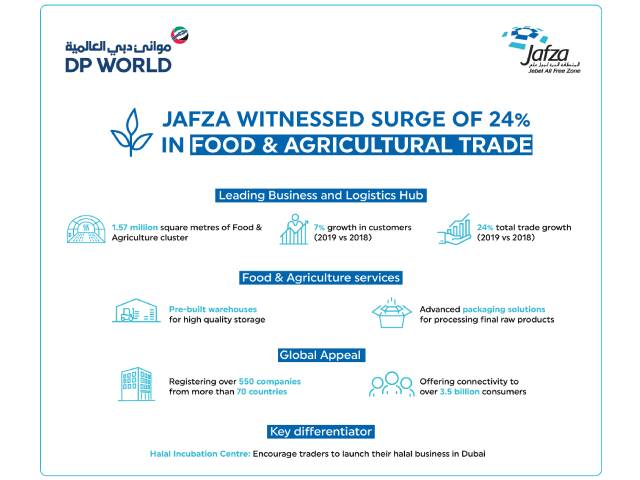Leading business and logistics hub reinforces its status as a preferred destination for businesses related to food & agricultural commodities and sees its customer base grow by 7%
Jebel Ali Free Zone (Jafza), the leading business and logistics hub recorded a total trade growth of 24% and an increase of 7% in its customer base year-on-year in 2019, reinforcing its status as a preferred destination for businesses related to food & agricultural commodities.
The Free Zone has a dedicated Food and Agriculture cluster of 1.57 million square metres with over 550 companies from more than 70 countries, employing over 6,000 people. Thirty-eight per cent of these companies are from the Middle East, 23% from Asia, 19% from Europe, 10% from Africa, 8% from North America, 1% from South America and 1% from Oceania.
Jafza is home to some of the region’s top players in the industry such as Bayara, Al Khaleej Sugar, Alokozay, Nestle, Heinz, Unilever, Hunter Foods to name a few. The strategic location and premium facilities of Jafza have made it the preferred destination for many countries globally — including Brazil, the USA, Pakistan, Netherlands and South Africa, importing sugar, meat, cocoa, and dairy products. Meanwhile, Iraq, India and Saudi Arabia are among the top export destinations, exporting coffee, tea, fruits, spices and dairy products.
Mohammed Al Muallem, CEO & Managing Director, DP World, UAE Region and CEO of Jafza, said: “We have explored ways to further facilitate food trade and distribution while maintaining the continuity of food supply, which is crucial to the UAE and the region. Our mandate is to prioritise the needs of citizens and residents, and we have worked towards sustainability, ensuring sufficient food is available. We have ensured business continuity and a prompt recovery for the post COVID-19 economy. Illustrating Dubai’s role as a major gateway for global trade, the emirate’s external food trade volumes in the first half of this year reached nine million tonnes, representing AED32 billion in total, whereas Dubai’s food imports touched Dh22 billion. This demonstrates how robust Dubai’s economy is despite the global COVID-19 pandemic and also underpins the effectiveness of its food security strategies. In line with the newly launched UAE Sustainable Agriculture System, we aim to support the increase of self-sufficiency from agricultural production and workforce in the agricultural sector.”
DP World, UAE Region’s multimodal connectivity reinforces Dubai’s long-term commitment to maintain the growth and development of regional trade. Thanks to Jafza’s strategic location near Jebel Ali Port, it offers connectivity to over 3.5 billion consumers. With a reputation as one of the world’s finest locations for companies to establish their businesses and grow, the free zone ensures flexible services through Dubai Trade, DP World, UAE Region’s single window platform for cross-border trade.
To make it easier for investors and business owners in times of COVID-19, smart services from Dubai Trade include the “E-Delivery Order” to allow supply chain stakeholders to handle their complex import processes and ZADI, an innovative unified food import platform aimed at facilitating the import and re-export of food shipments throughout Dubai ports. All these services are accessible online to minimise the need for manual transactions and personal visits.
With Jafza, food and agricultural businesses can benefit from advanced packaging solutions, and avail pre-built warehouses for high quality storage. It has also introduced a Halal Incubation Centre to encourage traders to launch their halal business in Dubai. Via Jafza, users can accelerate their end-to-end halal food supply chain. This represents a major business opportunity and is just another example of Jafza’s constant excellence.









































